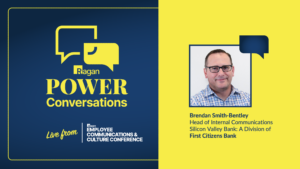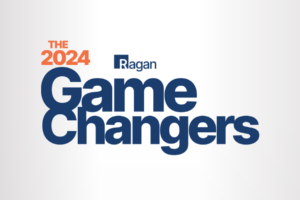REI Co-op’s Halley Knigge: A game-changing communications trailblazer
The Director of Communications got her start in newspapers and credits her career path to chasing roles that pushed her to grow.

Halley Knigge, Director of Communications at REI Co-op, has been named one of Ragan’s 2023 Game Changers, sponsored by Omnicom, an honor that recognizes trailblazing leaders in the communications and PR industries.
Knigge currently plays a pivotal role in shaping the communication strategies that help showcase REI’s impact work and foster a sense of community among its members and employees. Before her tenure at REI, she spent four years as a spokesperson for Alaska Airlines, where she was the creative force behind the airline’s inaugural company blog and ghost-wrote tweets for a certain prominent Seattle quarterback.
“I started out my career thinking I was going to be a daily newspaper reporter,” Knigge said. “It took me a good 10 years to stop introducing myself as a journalist who’s currently working in PR.”
Since her start in newspapers, Knigge’s professional journey has pivoted through diverse sectors, including healthcare, nonprofits and education. Her versatility is a testament to her adaptability and ability to thrive in various environments.
To set the stage for her recognition at Ragan’s Future of Communications Conference, Nov. 6–8 in Austin, we asked Knigge to share her decision-making tree for her career path, how she decides what is worth fighting for, and the one skill she recommends for communicators.
You’ve been able to pivot several times in your career. How do you decide what your next step is going to be?
If something makes me feel a little scared, it means it’s something that I need to do. There’s no growth without discomfort. I’ve tried to chase that feeling where I can, and I am always looking for where I can keep learning and keep contributing. Like: where is my background going to be helpful and interesting and applicable to my next position.
Is there a mistake you can point to in your career that you learn something from?
I had an experience with an announcement at a previous employer. [It was] a comprehensive package with a lot of storytelling, really big news. There was an element [that] I knew was really problematic, and was not the right thing to continue to do going forward. And I tried to raise the alarm bells, tried to find studies and research and third party validation to say, ‘Hey, here’s why we can’t be talking about this thing.’ I raised it to my boss and I tried to flag it as high as I could. The CEO ultimately said, ‘No, we want to move forward,’ and we did. And got a lot of backlash.
I think about this moment a lot. It’s not necessarily a mistake that I made, but it’s a moment to me where it [reinforced] my conviction that my job is to make sure that I am delivering my absolute best recommendation in a way that leaders can hear it, and [to] make sure they’re walking in eyes wide open. I wish I had found a way to fight harder on that one or found a way to convince the leadership otherwise.
Our job is not to convince everybody of every recommendation. The only failure is if we walk away not having made our very best, most passionate recommendation.
How do you choose the fights to fight? Are there times when you’re like, Okay, I can back off on this one because there’s another one coming? Where do you draw that line?
I joke that I will choose one hill to die on every month. It’s kind of random, it can be something really small or it can be something much bigger. I don’t want to be screaming into the void. So: Where can I really have an impact, and could I potentially make some small change that can be beneficial to the organization or customers?
If it’s in the context of work, it has to align with company values and policies and processes and where we want to go in the future. And then there’s some personal [moments], you know. I’ve had a male peer [give] a female employee on my team some tone-based feedback. I was like, alright, I’m taking my earrings off, it’s going down.
If you had to pinpoint one skill that you think communicators need to master in the upcoming one to five years, what would it be?
Business fluency, and not just how not just how money is made, but how the core operations of the company work.







